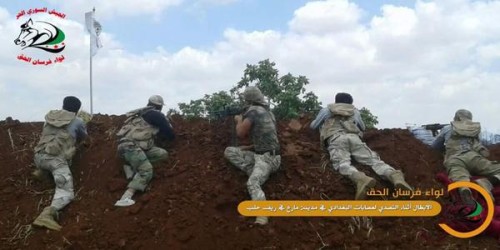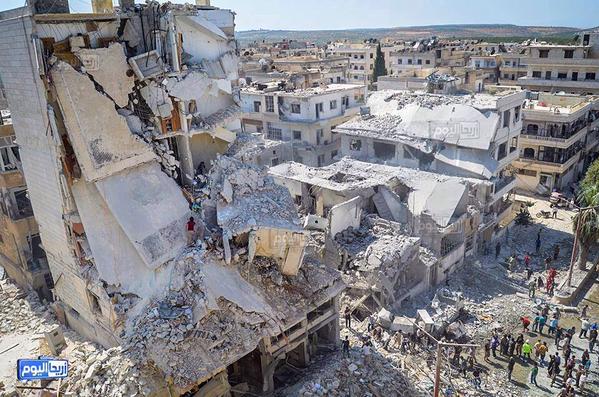PHOTO: Rebels facing the Islamic State near Mare’ in northern Syria, June 2015
LATEST
- UK Prime Minister: Our Drone Strike inside Syria in August Killed Two British Nationals
- Kurdish Militia: Opposition Syrian National Coalition Supports Islamic State
- Pro-Regime Newspaper: Russia Steps Up Military Aid But “No Fundamental Change” in Its Forces in Syria
- Video: Day 67 of Hezbollah-Regime Offensive on Zabadani in Damascus Province
- Islamic State Captures Town Near Key Gas Fields in Homs Province
- Rebel Commander Killed in Regime Airstrike Near Damascus
- Photo and Video: Destruction in Ariha in Idlib Province from Helicopter Bombing
- More Than 200,000 Syrian Refugees in Jordan Learn By Text Message of Cut in Food Aid
MONDAY FEATURE
Analysis: Why The US Should Support Southern Rebels
After a series of delays and high-profile embarrassments in its $500 million train-and-equip program for Syria’s rebels, the US Government has promised an improved and expanded effort.
Pentagon officials told The New York Times of plans to “drop larger numbers of fighters into safer zones as well as providing better intelligence and improving their combat skills”, following “classified assessments” of shortcomings in the program, first approved last autumn.
However, “four senior Defense Department and Obama administration officials” said no decisions have been made on specific proposals.
The first fighters were supposed to be on the battlefield by March but, because of bureaucratic and logistic delays, the initial group — consisting of only 54 troops of 1,500 rebels who sought admission — was sent from Turkey into Syria in July.
The 54 fighters, and the Free Syrian Army’s Division 30 which hosts them, were attacked within days by the Islamist faction Jabhat al-Nusra. Division 30’s commanders, his deputy, and 16 other troops were kidnapped. Then Jabhat al-Nusra attacked Division 30’s headquarters, killing, wounded, and capturing more men.
The attacks on Division 30 were assisted by prominent stories and photographs which announced the entry of the 54 US-trained fighters into Aleppo Province. The division’s commander warned, just before his abduction by Jabhat al-Nusra, that Washington was not providing protection for the troops.
Reports last week said Division 30 was being prevented from moving into the frontline town of Mare’ in northern Aleppo Province — where rebels are trying to hold back an Islamic State offensive — because of Jabhat al-Nusra’s threats.
The US officials told the Times:
The rebels were ill-prepared for an enemy attack and were sent back into Syria in too small numbers. They had no local support from the population and had poor intelligence about their foes. They returned to Syria during the Eid holiday, and many were allowed to go on leave to visit relatives, some in refugee camps in Turkey — and these movements likely tipped off adversaries to their mission. Others could not return because border crossings were closed.
A spokesman for the US task force training the rebels said in an e-mail:
As with any difficult endeavor, we expected setbacks and successes, and we must be realistic with those expectations. We knew this mission was going to be difficult from the very beginning.
Despite the promise of a better program — if it is approved — the Times notes fundamental problems, such as conflicts between Washington and rebel groups over the mission and American refusal to work with many of the rebel factions:
After a year of trying, however, the Pentagon is still struggling to find recruits to fight the Islamic State without also battling the forces of President Bashar al-Assad of Syria….
The willing few face screening, but it is so stringent that only dozens have been approved from among the thousands who have applied, and they are bit players in the rebellion. The program has not engaged with the biggest, most powerful groups…that are better funded, better equipped and more motivated.
The US has agreed to Turkey’s proposal for a “safe zone” along a 98-km (61-mile) belt in northern Syria along the Turkish border, albeit without using the term and saying only that the Islamic State will be cleared from the area.
However, signs of implementation have been sporadic. There has been little assistance for rebels facing the Islamic State’s attacks near Mare’, 20 km (13 miles) from the border, after the militants captured nearby villages.
UK Prime Minister: Our Drone Strike inside Syria in August Killed Two British Nationals
Prime Minister David Cameron has told Parliament that a drone strike inside Syria — the first UK attack in the 4 1/2-year conflict — killed two British nationals and a third Islamic State fighter on August 21.
Cameron said the strike that killed Reyaad Khan of Cardiff in Wales, as well as Ruhul Amin from Aberdeen in Scotland, was an “act of self-defense”:
There was a terrorist directing murder on our streets and no other means to stop him….
But I am not prepared to stand here in the aftermath of a terrorist attack on our streets and have to explain to the House why I did not take the chance to prevent it when I could have done.
The Prime Minister did not offer the information pointing to Khan’s direction of “murder” in Britain, nor did he explain why the Government waited almost three weeks to reveal the news.
It had been expected that Cameron would discuss possible British military action inside Syria to stem the displacement of civilians — which would raise questions of operations against the Assad regime as well as the Islamic State.
The Prime Minister did say that Britain — which has only taken in 216 Syrian nationals asking for asylum since March 2011 — would now accept 20,000 refugees over the next five years.
Kurdish Militia: Opposition Syrian National Coalition Supports Islamic State
In a further sign of tension over northern Syria, the official spokesman of the Kurdish militia YPG has accused the externally-based opposition Syrian National Coalition of supporting the Islamic State.
Redur Khalil said that the Coalition has provided “political cover” to Islamic State attacks on Kurdish areas in northern Syria:
SNC represents a political face for the ISIS terrorist group. The coalition and its Interim Government have been providing political and financial support to ISIS since the radical group swept into Rojava [Syrian Kurdistan].
We are aware that the SNC is using the financial aid it receives from the West to support ISIS.
The spokesman claimed that the Coalition has been funding ISIS-held hospitals in the towns of Tel Brak and Tel Hamis in northeastern Syria, and that it has cooperated with Turkey in the supply of military equipment to the militants in northern Aleppo Province.
“They have been supporting the terrorist group against the Kurdish forces for years,” he asserted, calling on the US and European states to reconsider their relations with the Coalition.
Pro-Regime Newspaper: Russia Steps Up Military Aid But “No Fundamental Change” in Its Forces in Syria
Lebanon’s As-Safir newspaper, which supports the Assad regime, said on Monday that Russia has stepped up military aid to Damascus but that there has been “no fundamental change” in Russian forces on the ground.
Citing a “Syrian source”, As-Safir said Russian personnel were “still operating in the framework of experts, advisers, and trainers”.
International media, picking up fragments of evidence of the Russian aid, have turned the story into one of Moscow’s intervention with “boots on the ground” and warplanes in the sky.
See Syria Analysis: Challenging the Rumors of Russia’s Military Intervention…Again
As-Safir said a team of Russian experts began inspecting Syrian military airports weeks ago, planning to expand some of their runways, “particularly in the north” of the country.
The newspaper said nothing had been decided on “the nature of the weapons that Damascus might receive, though the Syrians asked to be supplied with more than 20 Russian attack helicopters of the Mi-28 type”.
Video: Day 67 of Hezbollah-Regime Offensive on Zabadani in Damascus Province
Video of Hezbollah and Assad forces moving towards a roundabout in Zabadani, 31 km (19 miles) northwest of Damascus:
The Hezbollah-regime offensive began July 3 with expectation of a quick victory to counter news of rebel advances elsewhere in Syria. However, the assaults — supported by hundreds of airstrikes — have faced fierce resistance.
Ceasefire talks between Iranian officials, representing the Assad regime, and rebels broke down at the end of August.
This morning pro-regime outlets are claiming the capture of the central bus station in Zabadani — more than seven weeks after they said that the Hezbollah-regime force was on the verge of taking the facility.
Islamic State Captures Town Near Key Gas Fields in Homs Province
After months of attacks, the Islamic State has captured a town near key gas fields in eastern Homs Province in central Syria.
The militants took the town of Jazal on Sunday. The pro-regime Al-Masdar News said the Islamic State briefly held two gas wells in the nearby Jazal fields before it was pushed back.
The town of Jazal is 2 km from the Al-Shaar fields, which control electrical distribution to Homs Province. It is 10 km (6 miles) north of the Roman-era city of Palmyra, captured by the Islamic State in May.
Rebel Commander Killed in Regime Airstrike Near Damascus
A rebel commander was killed by a regime airstrike in Darayya, south of Damascus, on Sunday.
Both regime and opposition outlets said Abu Amer, head of Ajnad al-Sham’s Military Council, was slain along with 12 of his fighters.
Ajnad al-Sham has been among rebel factions putting pressure on regime forces in Darayya, which is divided between the two sides.
Photo and Video: Destruction in Ariha in Idlib Province from Helicopter Bombing
An image of the destruction in the town of Ariha, in Idlib Province in northwest Syria, after helicopter bombing on Sunday:
The Local Coordination Committees said 31 people in Idlib Province were among 68 killed in Syria yesterday.
State news agency SANA claims from a “field source” that “40 terrorists from Jaish al-Fateh were killed during army operations that targeted their hideouts near al-Shami Hospital”.
Ariha was captured by rebels in May as they took over almost all of Idlib Province.
Video of one of Sunday’s bombs:
More Than 200,000 Syrian Refugees in Jordan Learn By Text Message of Cut in Food Aid
Almost 230,000 Syrian refugees in Jordan have learned via text message that their UN food aid is being cut.
Earlier this month, the World Food Program said the the refugees, who live in urban communities in Jordan, would lose their food vouchers.
“What shall I do? Sell myself or sell my three girls?” Om Rabab, a refugee said.
There are almost 630,000 registered Syrian refugees in Jordan.
The WFP has warned for more than a year of a funding crisis. In July, it halved the value of food vouchers to more than 1.1 million Syrian refugees in Lebanon.
UN agencies said this summer that a $4.5 billion appeal for 2015 was less than 25% funded. A WFP spokesperson said the program needs $236 million for its operations through November.


